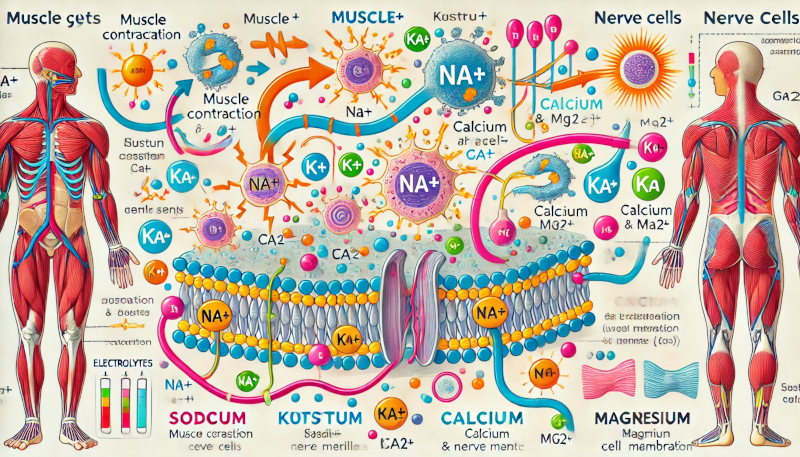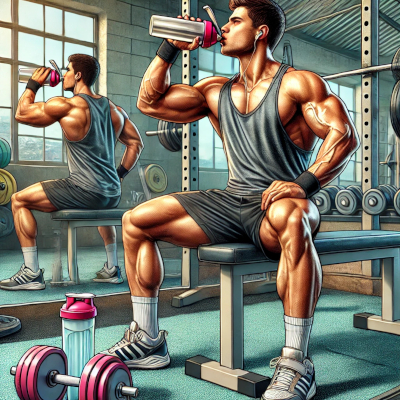Introduction
When it comes to athletic performance, hydration is often underestimated. Many athletes believe that staying hydrated means just drinking water, but the reality is much more complex. Proper hydration involves a careful balance of fluids, electrolytes, and timing. This blog will delve into the science of hydration for athletes, bust myths, and provide actionable tips to help you stay at the top of your game.

The Science of Hydration
Why Hydration Matters
Hydration affects nearly every aspect of athletic performance. Water makes up about 60% of our body weight and is crucial for various bodily functions, including temperature regulation, joint lubrication, and nutrient transportation. For athletes, even slight dehydration can lead to significant drops in performance and increased risk of injury.
Electrolytes: The Unsung Heroes
Electrolytes, such as sodium, potassium, calcium, and magnesium, are minerals that carry an electric charge. They are essential for many bodily functions, including muscle contractions and nerve function. When you sweat, you lose not just water but also electrolytes, which need to be replaced to maintain optimal performance.

Hydration Myths Busted
Myth 1: Only Drink When You’re Thirsty
Thirst is a delayed response to dehydration. By the time you feel thirsty, you may already be dehydrated. Athletes should drink at regular intervals, especially during prolonged exercise.
Myth 2: Water is Enough
While water is crucial, it doesn’t contain electrolytes. For long-duration activities, a sports drink that replenishes electrolytes is often necessary to prevent imbalances that can lead to cramps, fatigue, and other issues.
Myth 3: Overhydration is Impossible
Overhydration, or hyponatremia, is a condition where the balance of electrolytes in your body is disrupted due to excessive water intake. This can be just as dangerous as dehydration, leading to confusion, seizures, and even death in extreme cases.
The Role of Hydration in Different Sports
Endurance Sports
Endurance athletes, such as marathon runners, cyclists, and triathletes, lose significant amounts of fluids and electrolytes through sweat. Proper hydration strategies for these athletes include:
- Pre-hydration: Begin hydrating 2-3 hours before the event with water and electrolyte-rich beverages.
- During the event: Drink at regular intervals (every 15-20 minutes), using sports drinks to replenish lost electrolytes.
- Post-event: Rehydrate with a mix of water, electrolytes, and carbohydrates to aid recovery.

Team Sports
For athletes in sports like soccer, basketball, and hockey, hydration strategies must account for the intermittent nature of play and the varying levels of intensity.
- Pre-game: Ensure adequate hydration by drinking water throughout the day and a sports drink 30 minutes before the game.
- During the game: Take advantage of breaks to drink water or a sports drink.
- Post-game: Rehydrate with water and electrolyte beverages, and eat a balanced meal to replenish nutrients.

Strength Sports
Strength athletes, such as weightlifters and bodybuilders, may not sweat as much as endurance athletes, but hydration is still crucial for muscle function and recovery.
- Pre-workout: Drink water and an electrolyte beverage to ensure proper hydration.
- During workout: Sip water regularly, especially during intense sessions.
- Post-workout: Rehydrate with water, electrolytes, and a protein-rich meal to support muscle recovery.

Tailoring Hydration to Individual Needs
Sweat Rate and Hydration
Understanding your sweat rate is crucial for developing a personalized hydration strategy. Here’s how to calculate it:
- Weigh yourself before exercise (nude or in minimal clothing).
- Exercise for one hour, drinking a known volume of water.
- Weigh yourself again immediately after exercise.
Subtract your post-exercise weight from your pre-exercise weight, and add the weight of any fluid consumed during exercise. This gives you your sweat rate per hour.
Hydration and Weather Conditions
Weather conditions significantly impact hydration needs. Hot and humid conditions increase sweat rates, requiring more frequent fluid intake. Conversely, cold weather can suppress thirst, making it essential to consciously drink fluids even if you don’t feel thirsty.
Gender Differences in Hydration
Research suggests that men and women may have different hydration needs. Women often have a lower sweat rate and different electrolyte loss patterns than men. Female athletes should consider these differences when planning their hydration strategies, especially during the menstrual cycle, which can affect fluid balance.
Practical Hydration Tips
Pre-Exercise Hydration
Start hydrating well before your workout or competition:
- Drink 500-600 ml of water 2-3 hours before exercise.
- Drink 200-300 ml of water 20-30 minutes before starting.
During Exercise
- Sip water regularly: Aim for 200-300 ml every 20 minutes.
- Use sports drinks: For activities longer than an hour, incorporate sports drinks to replenish electrolytes and carbohydrates.
Post-Exercise
- Rehydrate with water and electrolyte-rich beverages within 30 minutes of finishing.
- Eat a balanced meal with carbohydrates and protein to aid recovery.
Everyday Hydration
Maintaining good hydration isn’t just about what you do around exercise. Here are some tips for staying hydrated daily:
- Carry a water bottle: Make it a habit to drink water throughout the day.
- Eat water-rich foods: Incorporate fruits and vegetables like watermelon, cucumbers, and oranges into your diet.
- Limit diuretics: Reduce intake of caffeine and alcohol, as they can increase fluid loss.

Conclusion
Hydration for athletes is far more than just drinking water. It involves understanding the complex interplay between fluids, electrolytes, and individual needs. By developing a personalized hydration strategy, you can optimize your performance, reduce the risk of injury, and enhance recovery. Remember, hydration is an ongoing process that requires attention both on and off the field. Stay hydrated, stay healthy, and keep pushing your limits.

